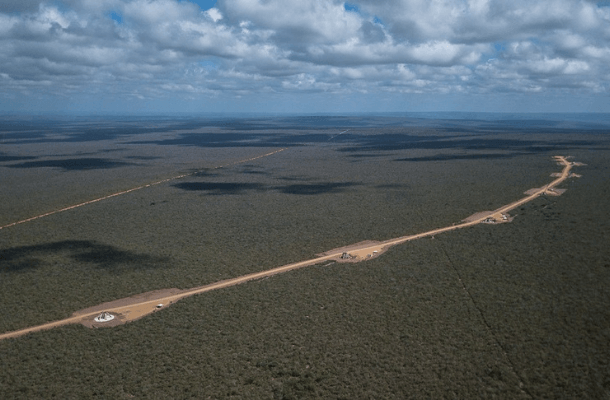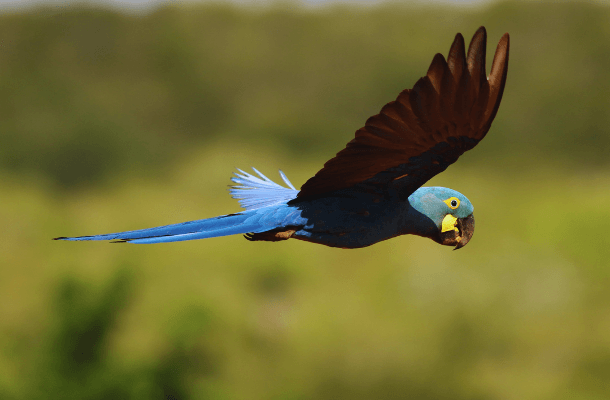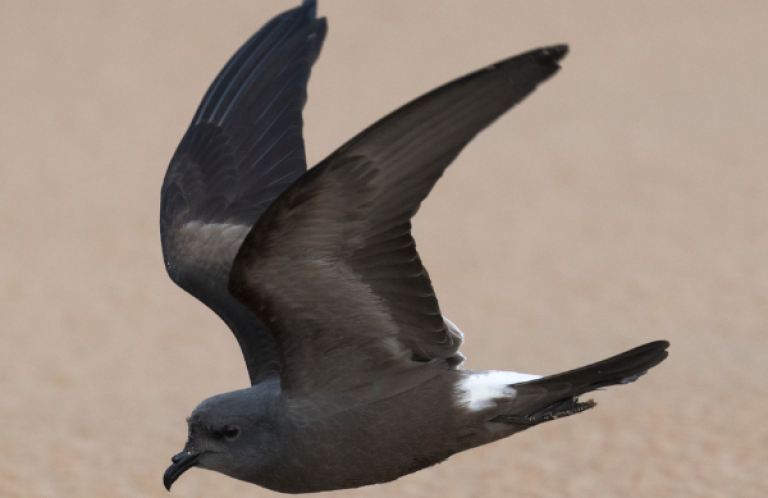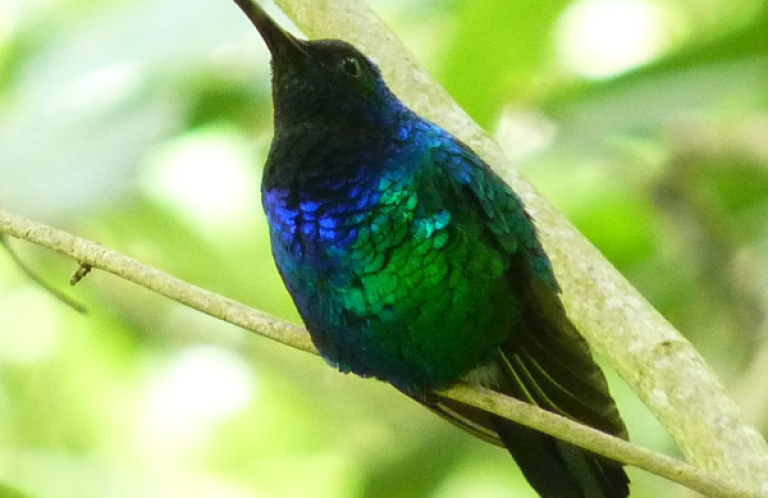French Corporation Destroying Habitat of Endangered Brazilian Parrot

This recent photo shows that habitat of the Endangered Lear's Macaw has been cleared for construction of the “Canudos 1” wind energy facility in Bahia, Brazil. Each of the larger cleared areas would house a wind turbine, with fast-spinning blades putting the birds at risk. Photo by Thomas Bauer – CPT/H3000
(UPDATE: December 21, 2021) Recent photographic evidence in Bahia, Brazil shows extensive land-clearing in the habitat of the Endangered Lear's Macaw and confirms that Paris-based energy company Voltalia is close to installing wind turbines — recklessly moving forward with construction of a wind energy facility despite the state Public Prosecutor's recommendation in July 2021 that the project be halted.
Click here for French version | Contact: Jordan Rutter, Director of Public Relations | jerutter@abcbirds.org | @JERutter

Lear's Macaw in flight. The Lear's Macaw was rescued from the brink of extinction, but wind energy development has emerged as a new and potentially deadly threat within the species' small range. Photo by Daniel Lebbin
(Washington, D.C., September 7, 2021) Voltalia, an energy company based in Paris, is developing a wind energy facility in the habitat of the Endangered Lear's Macaw, in spite of requests from international conservation groups and local communities to move the project. This is occurring as France hosts the IUCN World Conservation Congress, a global event held every four years that focuses on driving conservation and sustainable development action.
The Lear's Macaw — once on the brink of extinction — has been a beacon of hope for the conservation community and for Brazil in particular. Thanks to decades of conservation efforts led by Brazilian organizations such as Fundação Biodiversitas, the population of Lear's Macaw has grown from fewer than 100 in the 1980s to around 2,000 birds today, but remains extremely fragile.
Trafficking for the pet trade was one of the key threats responsible for nearly wiping out the species. Now, conservationists work to keep the population viable by overcoming persistent threats like the poaching of parrot nestlings for illegal trafficking, electrocution at power lines, and lack of new growth of their main food, the Licurí Palm. Adding one or more wind facilities to this long list of threats could quickly reverse the positive trajectory of this species' recovery.
Voltalia is destroying habitat in one of Earth's most important sites for biodiversity. The wind facility would be located in Brazil's Caatinga region, in an area recognized as an Alliance for Zero Extinction (AZE) site because of the presence of the Lear's Macaw. It is also designated a Key Biodiversity Area (KBA) because of its biodiversity importance.
Voltalia had already cleared vegetation for the turbines when the Public Ministry of Bahia, Brazil, on July 22 confirmed that Brazilian environmental law was violated and that the project should be suspended or canceled completely until appropriate steps are taken to assess potential environmental impacts.
On August 31, more than 70 local groups issued a public letter detailing the harm to communities already caused by the project and urging Voltalia to stop. The letter states that the wind energy facility “will affect the livelihoods of several traditional communities, in addition to impacting the local fauna and flora.” They also note that the circumvention of legal requirements, such as development of an Environmental Impact Statement and consultation with communities, represents a “serious violation of the rights of populations directly and indirectly affected.”
“It's devastating,” says Mike Parr, President of American Bird Conservancy (ABC). “It's surprising enough that anyone would even consider a wind facility here, let alone proceed this far with the project. To then destroy an Endangered species' habitat without assessing environmental impacts is shocking. This project must be canceled, and the species' habitat restored immediately.”
The Public Ministry's July 22 request that the project be halted for further assessment is hopeful news. However, the species remains in danger given that Voltalia has not yet indicated that it will cancel or move the project. International conservation organizations, including American Bird Conservancy (ABC); Brazilian groups Fundação Biodiversitas and SAVE Brasil; BirdLife International; Ligue pour la Protection des Oiseaux (LPO); World Wildlife Fund-Brazil; and others have united against the threat, with a plea that Voltalia relocate the project and restore habitat.
“The Lear's Macaw already faces too many threats to its continued existence — it doesn't need another,” says Parr. “Constructing a wind facility here would put tenuous and hard-won conservation gains in jeopardy. In no uncertain terms, this wind energy project is dangerous and irresponsible. It must be moved to another location immediately.”
Voltalia's own Sustainability Report states that “Voltalia works to meet IFC's (International Finance Corporation) Performance Standards on Environmental and Social Sustainability.” This project clearly does not meet IFC's performance standards, given IFC's recognition of the importance of AZE and KBA sites.
Voltalia also has several shareholders, including PROPARCO, a division of the French governmental development agency, and the European Bank for Reconstruction and Development, which claim to have stringent safeguards. According to its website, PROPARCO has committed to the requirements of IFC's performance standards.
“We fully recognize the immense importance of shifting from fossil fuel-based energy sources to renewables, as well as the importance of sustainable development and energy provision in Brazil,” says Joel Merriman, Bird-Smart Wind Energy Campaign Director at ABC. “We do not take this stance against the project lightly. However, given the very real threat of irreversibly impacting a highly threatened species, it is imperative that the project be moved, and the birds' habitat restored.”
“Appropriate siting is far and away the most important part of minimizing a wind energy facility's impacts on birds,” says Merriman. “On that count, this project has failed spectacularly. The Lear's Macaw flies in flocks at fast speeds, high off the ground, making it high-risk for fatal collisions with wind turbines. The birds are also active in periods of low light at dawn and dusk, further increasing collision risk. This is a long-lived, slow-reproducing species, so the loss of even one individual is a concern.”
“There is far too much at stake with this project,” says Parr. “Renewable energy is vitally important in the fight against climate change. At the same time, we have to be smart about where we place wind turbines. This project does nothing of the sort, putting an imperiled species at risk.”
Further Information:
- Fact-checking Voltalia's Claims About Its Canudos Wind Energy Project (Sept 3, 2021): English
- International Conservation Groups' Letter to Voltalia (Sept 3, 2021): English, Français
- ABC Press Release (July 21, 2021): Will French Energy Company Voltalia Doom an Endangered Brazilian Parrot? English, Français
- A change.org petition asking for the project to be relocated generated more than 77,000 signatures during the summer of 2021.
- News media coverage in Brazil has been extensive (see here). Mongabay has also covered the story in its English language edition.
- ABC Bird-Smart Wind Energy Program: English
- Lear's Macaw video
###
American Bird Conservancy is a nonprofit organization dedicated to conserving wild birds and their habitats throughout the Americas. With an emphasis on achieving results and working in partnership, we take on the greatest problems facing birds today, innovating and building on rapid advancements in science to halt extinctions, protect habitats, eliminate threats, and build capacity for bird conservation. Find us on abcbirds.org, Facebook, Instagram, and Twitter (@ABCbirds).
Ligue pour la Protection des Oiseaux (LPO): Founded in 1912, LPO is today one of the largest French conservation NGOs, focused on wildlife protection, preservation of natural habitats and public education. Find us on lpo.fr, Facebook, Instagram and Twitter.


















































